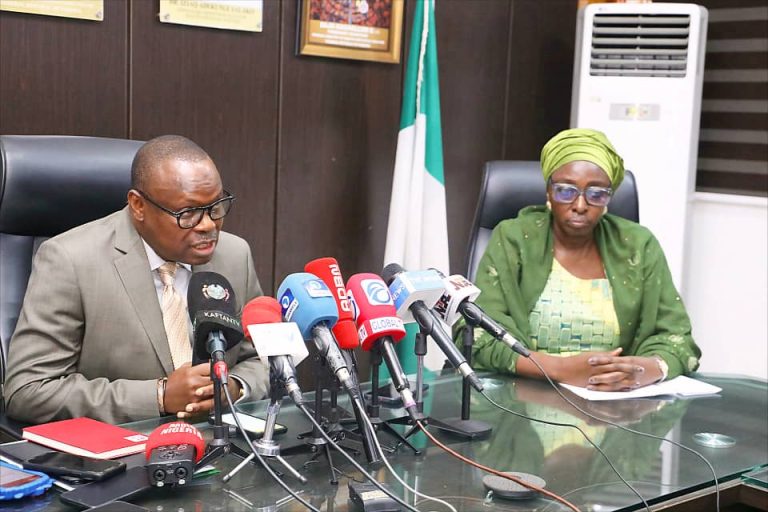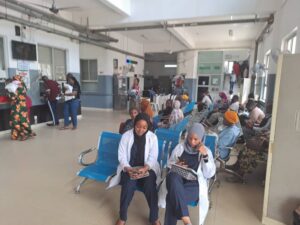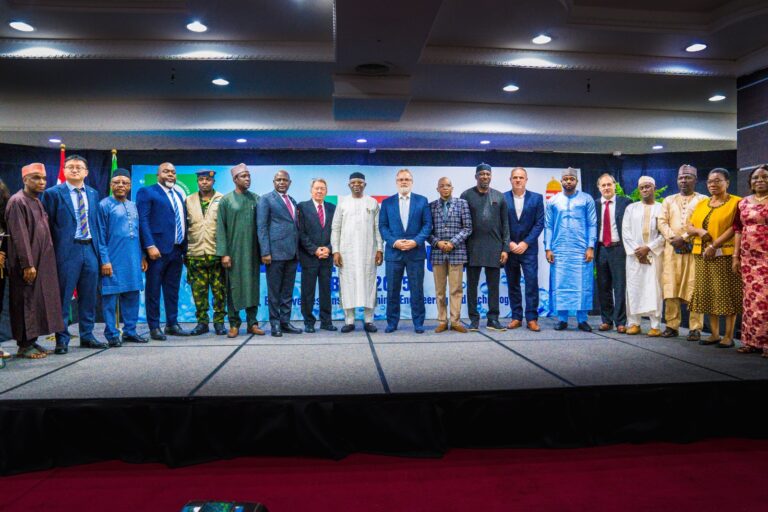
………Set up taskforce to monitor Doctor’s on duty on the ongoing strike
By Fatima Saka
The Federal Government has acknowledged that Nigeria is facing a severe shortage of health workers, describing it as part of a wider global crisis affecting the availability of skilled medical professionals.

Minister of State for Health and Social Welfare, Dr. Iziaq Adekunle Salako, disclosed this during a media briefing in Abuja, where he outlined government strategies to address manpower deficits, mitigate the impact of migration, and sustain essential medical services amid the ongoing strike by resident doctors.
“Starting from this day, the fact of the matter is that there is a shortage of health workers globally and also in Nigeria,” Dr. Salako said. “The World Health Organization recommends a ratio of one doctor to 1,000 patients. In Nigeria today, we are at about one doctor to 3,500 people. So generally, there is a shortage, and that global shortage fuels migration across borders.”
He explained that due to rising global demand, many Nigerian doctors and nurses are being recruited abroad, worsening the local manpower crisis. However, he assured that the Federal Government is rising to meet the challenge through a comprehensive strategy designed to train, retain, and efficiently deploy health professionals across the country.
“Our strategy is twofold,” he said.
“First, to create more enabling environments to produce more doctors, nurses, and other health professionals — and second, to establish a system that allows hospitals to fill vacancies more quickly.”
While acknowledging the lengthy bureaucratic process for employing permanent staff, which involves multiple agencies, Dr. Salako revealed that hospitals have been empowered to employ temporary (locum) staff to fill immediate gaps caused by retirements and migration.
He also said the ministry is developing a universal protocol to guide chief executives of health institutions on the engagement of locum workers, including terms of contract and transition to permanent employment.
The minister announced that a taskforce has been established within the ministry to pay unscheduled visits to hospitals to monitor performance and ensure that non-striking workers remain on duty. “We are putting together a taskforce that will be paying unscheduled visits to hospitals to monitor those who are not on strike. Those who are on duty must be fully on ground to do their work,” he said.
On financial obligations, Dr. Salako confirmed that the Federal Government has made substantial progress in clearing arrears owed to doctors under the 25–35% salary award. “We agree that we are owing doctors about seven months of the 25–35% award,” he said. “The total sum owed is around ₦41 billion. Out of this, ₦10 billion was paid in August, ₦21 billion has now been paid, and another ₦12 billion is being processed for release. That covers the entire arrears.”
He assured that discussions with the Minister of Finance and the Accountant-General of the Federation were ongoing, expressing optimism that the remaining payments would be completed within the next 48 hours.
Addressing reports of rivalry among health professionals, the minister stressed that all cadres in the sector — doctors, nurses, and laboratory scientists — are equally important to the delivery of healthcare services.
“We treat every cadre as equal in importance. However, while we recognize their equality, we must also acknowledge their peculiarities in training, job evaluation, and remuneration. These distinctions must be fairly reflected,” he said.
Dr. Salako noted that Nigeria is exploring policies to turn its health workforce into a national asset, similar to models adopted by some countries that have structured the migration of health workers to generate foreign exchange. “Some countries have turned their health workers into economic assets by exporting skilled manpower under structured arrangements,” he said.
“Nigeria is considering a similar approach that allows us to retain some professionals while enabling others to serve as global ambassadors of our medical excellence.”
Reaffirming the administration’s commitment to sustainable health reform, Dr. Salako said all government efforts — from manpower expansion to welfare improvement, are aimed at building a resilient, efficient, and people-centered health system.
“The shortage of health workers is a global reality, but Nigeria is confronting it head-on,” he concluded. “Our goal is not just to fill gaps, but to build a sustainable workforce capable of meeting the health needs of our citizens and contributing to global health solutions.”
Also speaking, Clarifying the MDCN Issue, Dr. Abdu Enejo, Deputy Registrar of the Medical and Dental Council of Nigeria (MDCN), clarified that there had been no “downgrading” of membership certificates from the West African College of Physicians and Surgeons, but rather a categorization of qualifications in line with regulatory standards.
“There has been no downgrade. What we have is categorization based on specialty and institution. Any wrongly classified qualification can be resubmitted for correction,” Enejo explained.
READ ALSO: League of Yoruba Youths Rallies Support for Tinubu’s Economic Reforms, Calls for National Unity
Assurancing the Service Continuity, In his remarks, Dr. Yahaya Adamu, Chief Medical Director of the Federal Medical Centre, Keffi, assured that consultants and key staff across federal hospitals are sustaining emergency and critical services despite the strike.
“Our emergency units and theatres remain open. We urge the public to come forward for urgent care when necessary,” Adamu said.




